Anpassungsfähigkeit und Resilienz des Finanzsystems
Diese Forschungsgruppe untersucht kritische Aspekte der Anpassungsfähigkeit und Widerstandsfähigkeit von Finanzsystemen. Sie analysiert die Auswirkungen von Naturkatastrophen auf Finanzsysteme, die Auswirkungen politischer Präferenzen für die grüne Transformation und die Bedeutung von Kultur in den Volkswirtschaften.
Forschungscluster
Finanzresilienz und RegulierungIhr Kontakt

Mitglied - Abteilung Finanzmärkte
PROJEKTE
07.2016 ‐ 12.2018
Relationship Lenders and Unorthodox Monetary Policy: Investment, Employment, and Resource Reallocation Effects
Leibniz-Gemeinschaft
We combine a number of unique and proprietary data sources to measure the impact of relationship lenders and unconventional monetary policy during and after the European sovereign debt crisis on the real economy. Establishing systematic links between different research data centers (Forschungsdatenzentren, FDZ) and central banks with detailed micro-level information on both financial and real activity is the stand-alone proposition of our proposal. The main objective is to permit the identification of causal effects, or their absence, regarding which policies were conducive to mitigate financial shocks and stimulate real economic activities, such as employment, investment, or the closure of plants.
01.2015 ‐ 12.2019
Interactions between Bank-specific Risk and Macroeconomic Performance
Deutsche Forschungsgemeinschaft (DFG)
Referierte Publikationen

Competition between Financial Markets in Europe: What can be Expected from MiFID?
in: Financial Markets and Portfolio Management, Nr. 1, 2009
Abstract
The Markets in Financial Instruments Directive (MiFID) could be the foundation of new trading platforms in Europe. This contribution employs insights from the theoretical and empirical literature to highlight some of the possible implications of MiFID. In particular, we argue that more competition will lead to more liquid markets, reflected in lower bid–ask spreads and greater depth. It will also lead to innovation in incumbent markets and stimulate the design of new trading platforms. MiFID has already introduced more competition, as evidenced by the startup of Instinet Chi-X, the announcement of new initiatives, including Project Turquoise and BATS, and the reactions of incumbent exchanges.

Softening Competition by Inducing Switching in Credit Markets: A Correction
in: Journal of Industrial Economics, Nr. 3, 2008
Abstract
In a recent article in this journal, Bouckaert and Degryse [2004] (denoted B&D) present a model in which banks strategically commit to disclosing borrower information. In this note, we point out an error in B&D and show that, although banks' information disclosure may indeed arise in equilibrium, it only does so if adverse selection is not too harsh.
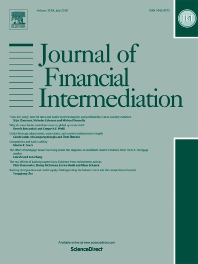
The Impact of Competition on Bank Orientation
in: Journal of Financial Intermediation, Nr. 3, 2007
Abstract
How do banks react to increased competition? Recent banking theory significantly disagrees regarding the impact of competition on bank orientation—i.e., the choice of relationship-based versus transactional banking. We empirically investigate the impact of interbank competition on bank branch orientation. We employ a unique data set containing detailed information on bank–firm relationships. We find that bank branches facing stiff local competition engage considerably more in relationship-based lending. Our results illustrate that competition and relationships are not necessarily inimical.

Interbank Exposures: An Empirical Examination of Contagion Risk in the Belgian Banking System
in: International Journal of Central Banking, Nr. 2, 2007
Abstract
Robust (cross-border) interbank markets are important for the proper functioning of modern financial systems. However, a network of interbank exposures may lead to domino effects following the event of an initial bank failure. We investigate the evolution and determinants of contagion risk for the Belgian banking system over the period 1993–2002 using detailed information on aggregate interbank exposures of individual banks, large bilateral interbank exposures, and cross-border interbank exposures. The "structure" of the interbank market affects contagion risk. We find that a change from a complete structure (where all banks have symmetric links) toward a "multiplemoney-center" structure (where money centers are symmetrically linked to otherwise disconnected banks) has decreased the risk and impact of contagion. In addition, an increase in the relative importance of cross-border interbank exposures has lowered local contagion risk. However, this reduction may have been compensated by an increase in contagion risk stemming from foreign banks.
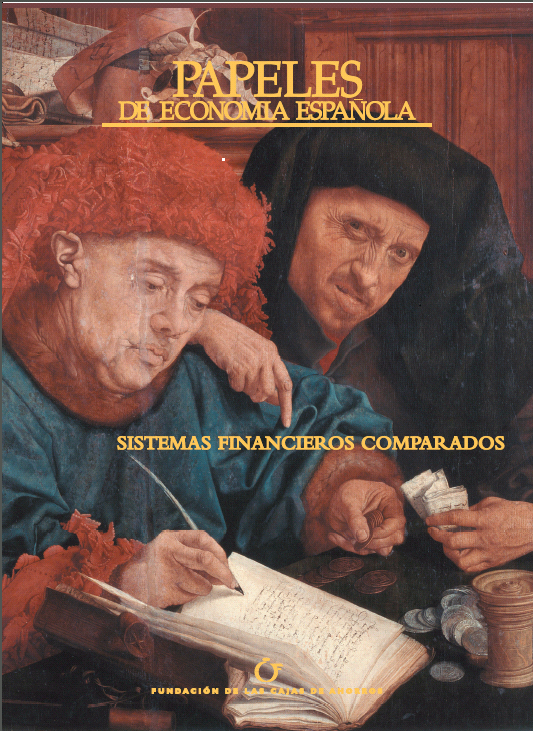
Repercusiones de la integración y consolidación de los sectores bancarios europeos sobre la innovación y las actividades de los emprendedores
in: Papeles de Economía Española, Nr. 110, 2006
Abstract
En este artículo se analiza si el programa de intensificación de la integración del sector financier europeo puede dañar a la innovación y al crecimiento en Europa. En particular, es preciso resaltar los problemas que dicha integración financiera puede ocasionar sobre los últimos avances en materia de desarrollo empresarial. La integración financiera, al intensificar la competencia y la consolidación del sector bancario europeo, podría poner en peligro la financiación procedente de las fuentes más innovadoras. Sin embargo, al sopesar los datos actuales, la conclusión es que estos problemas serían, a lo sumo, transitorios.
Arbeitspapiere
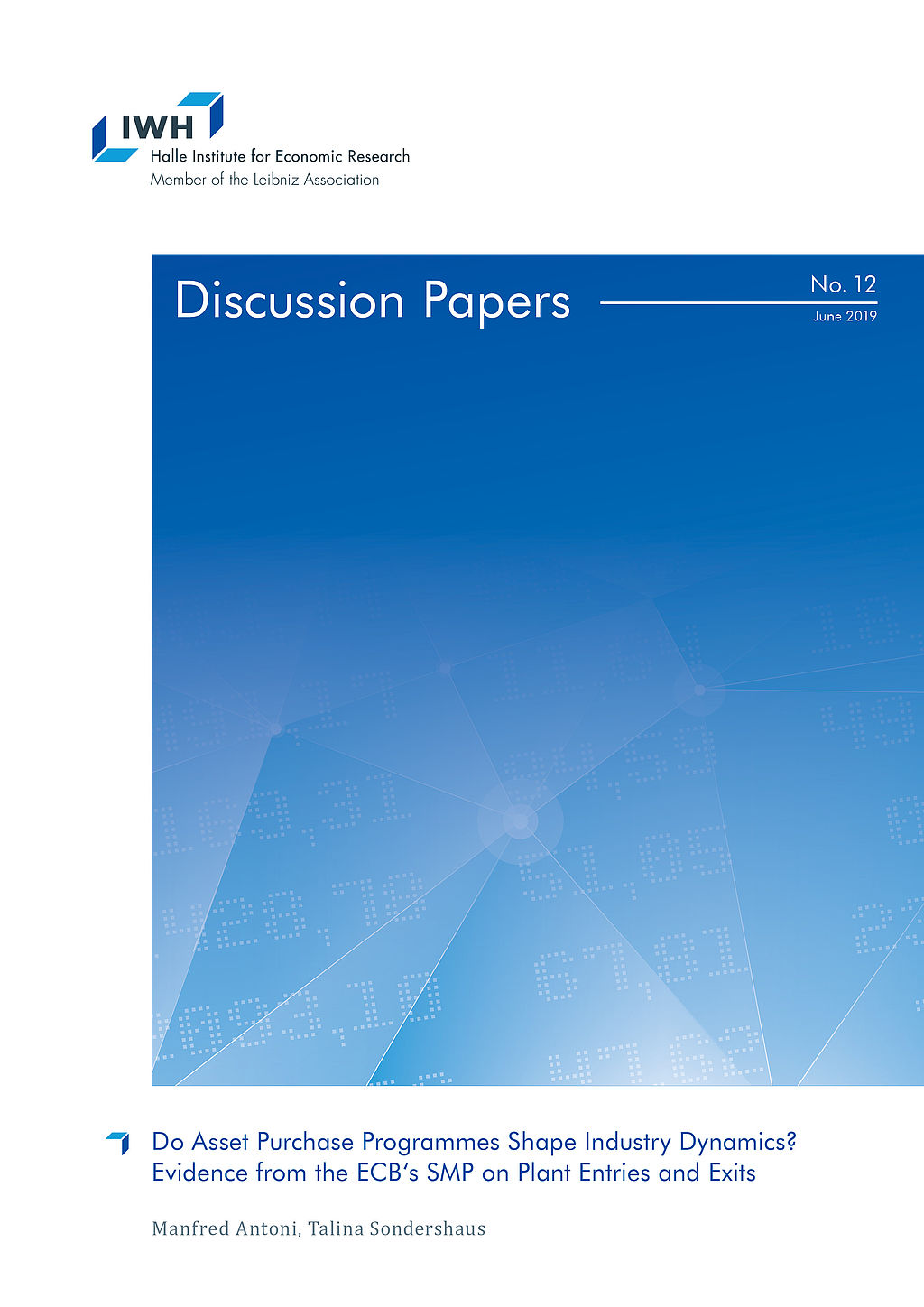
Do Asset Purchase Programmes Shape Industry Dynamics? Evidence from the ECB's SMP on Plant Entries and Exits
in: IWH Discussion Papers, Nr. 12, 2019
Abstract
Asset purchase programmes (APPs) may insulate banks from having to terminate relationships with unproductive customers. Using administrative plant and bank data, we test whether APPs impinge on industry dynamics in terms of plant entry and exit. Plants in Germany connected to banks with access to an APP are approximately 20% less likely to exit. In particular, unproductive plants connected to weak banks with APP access are less likely to close. Aggregate entry and exit rates in regional markets with high APP exposures are also lower. Thus, APPs seem to subdue Schumpeterian cleansing mechanisms, which may hamper factor reallocation and aggregate productivity growth.
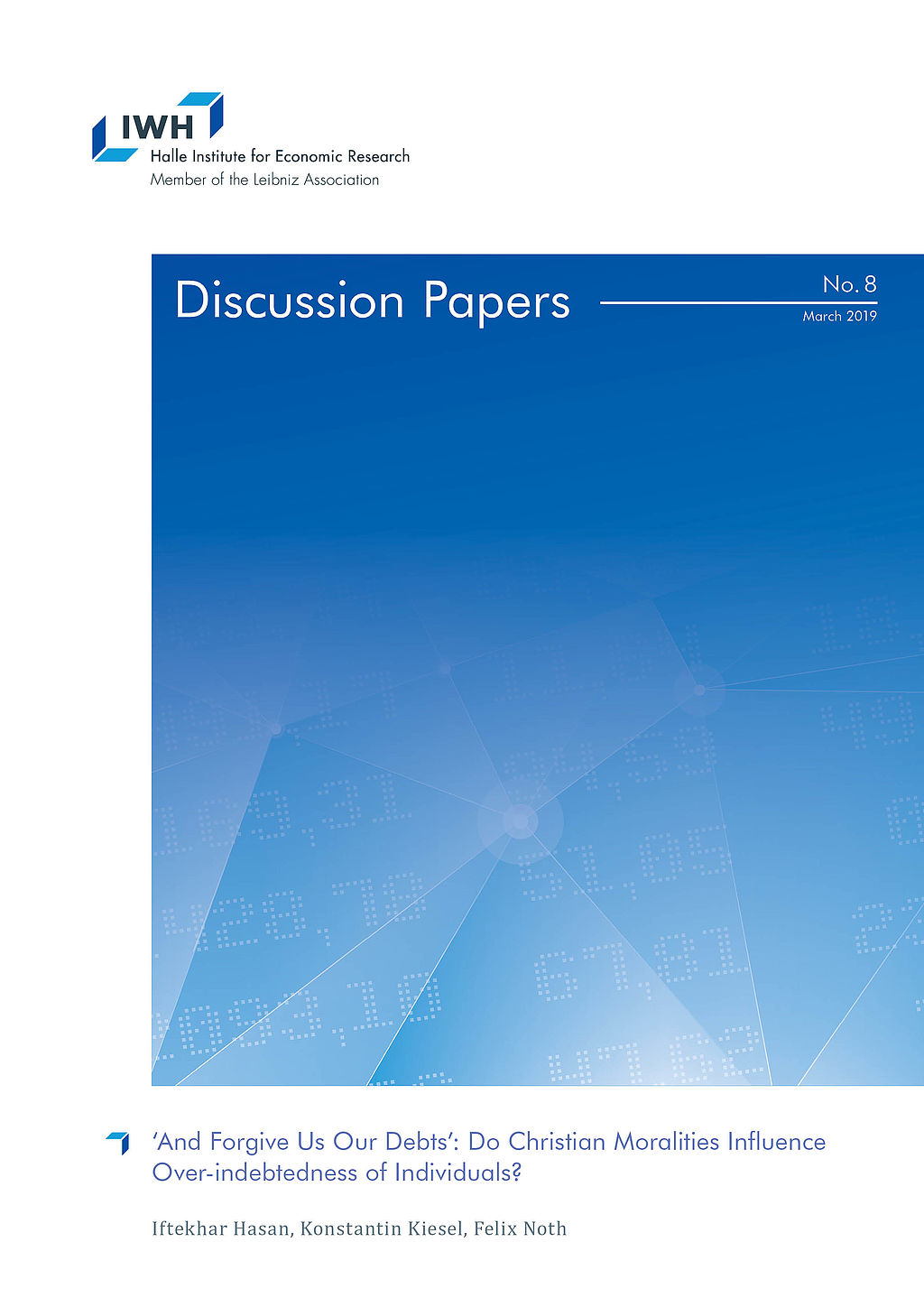
‘And Forgive Us Our Debts’: Do Christian Moralities Influence Over-indebtedness of Individuals?
in: IWH Discussion Papers, Nr. 8, 2019
Abstract
This paper analyses whether Christian moralities and rules formed differently by Catholics and Protestants impact the likelihood of households to become overindebted. We find that over-indebtedness is lower in regions in which Catholics outweigh Protestants, indicating that Catholics‘ forgiveness culture and a stricter enforcement of rules by Protestants serve as explanations for our results. Our results provide evidence that religion affects the financial situations of individuals and show that even 500 years after the split between Catholics and Protestants, the differences in the mind-sets of both denominations play an important role for situations of severe financial conditions.
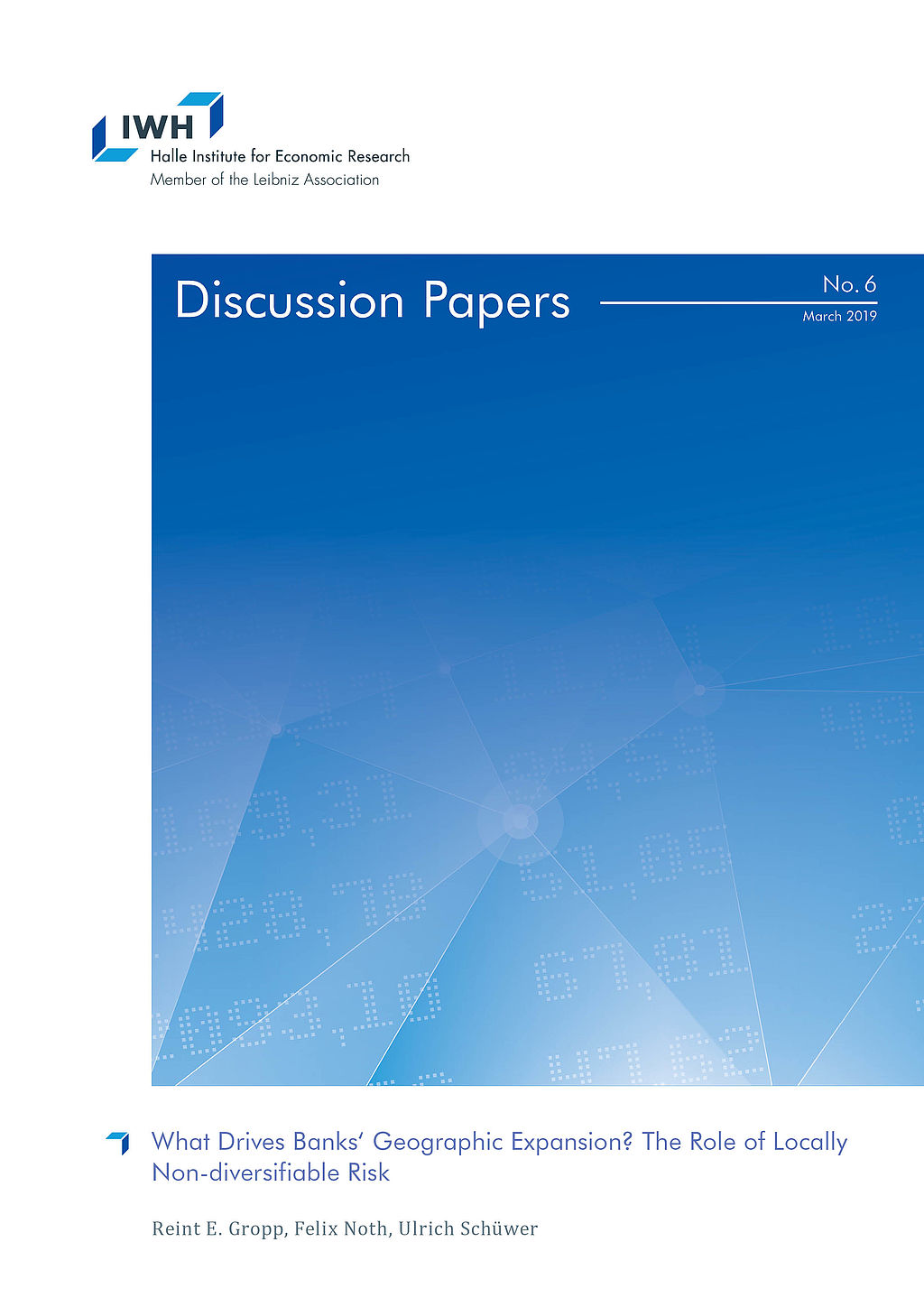
What Drives Banks‘ Geographic Expansion? The Role of Locally Non-diversifiable Risk
in: IWH Discussion Papers, Nr. 6, 2019
Abstract
We show that banks that are facing relatively high locally non-diversifiable risks in their home region expand more across states than banks that do not face such risks following branching deregulation in the 1990s and 2000s. These banks with high locally non-diversifiable risks also benefit relatively more from deregulation in terms of higher bank stability. Further, these banks expand more into counties where risks are relatively high and positively correlated with risks in their home region, suggesting that they do not only diversify but also build on their expertise in local risks when they expand into new regions.
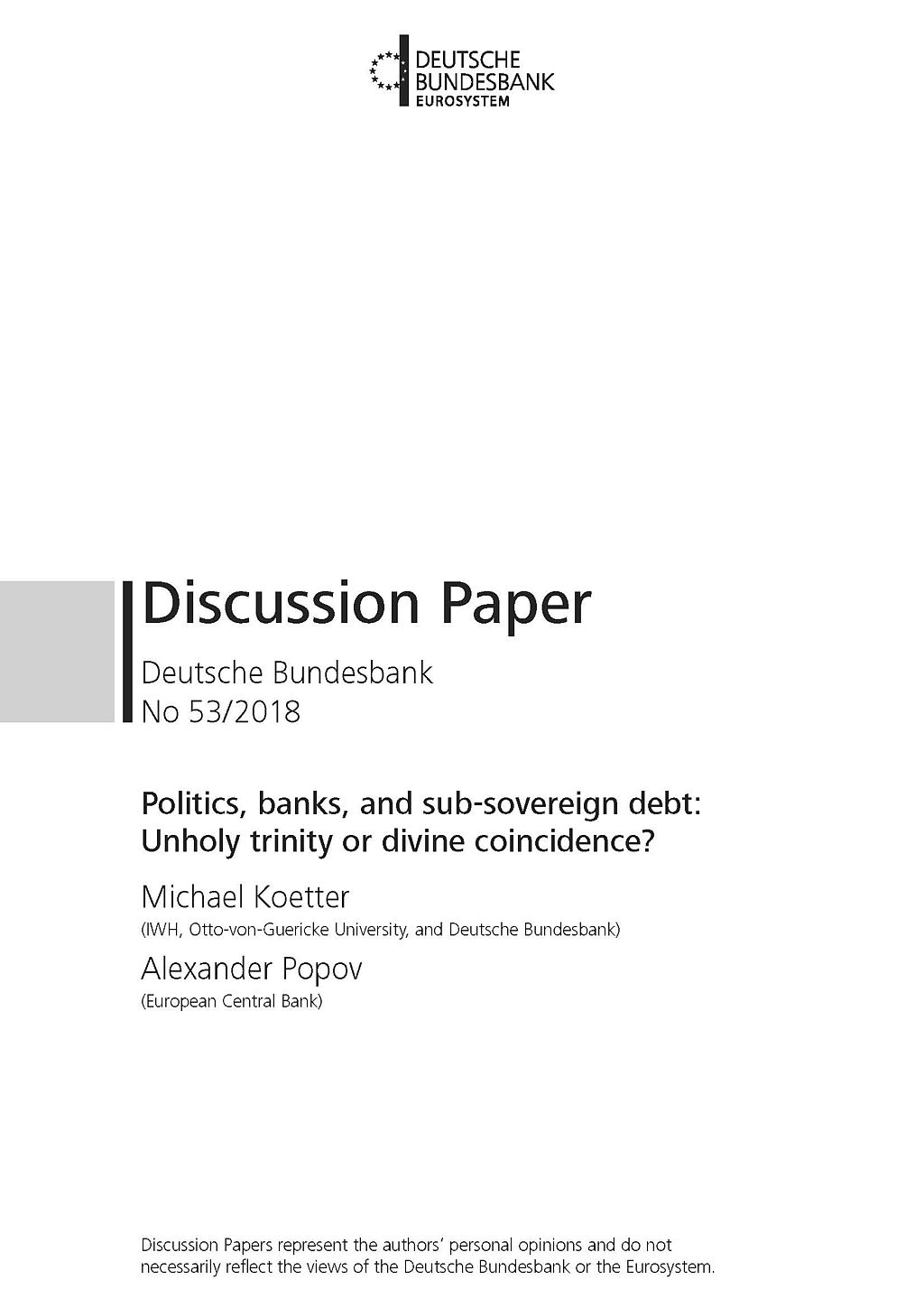
Politics, Banks, and Sub-sovereign Debt: Unholy Trinity or Divine Coincidence?
in: Deutsche Bundesbank Discussion Paper, Nr. 53, 2018
Abstract
We exploit election-driven turnover in State and local governments in Germany to study how banks adjust their securities portfolios in response to the loss of political connections. We find that local savings banks, which are owned by their host county and supervised by local politicians, increase significantly their holdings of home-State sovereign bonds when the local government and the State government are dominated by different political parties. Banks' holdings of other securities, like federal bonds, bonds issued by other States, or stocks, are not affected by election outcomes. We argue that banks use sub-sovereign bond purchases to gain access to politically distant government authorities.

May the Force Be with You: Exit Barriers, Governance Shocks, and Profitability Sclerosis in Banking
in: Deutsche Bundesbank Discussion Paper, Nr. 49, 2018
Abstract
We test whether limited market discipline imposes exit barriers and poor profitability in banking. We exploit an exogenous shock to the governance of government-owned banks: the unification of counties. County mergers lead to enforced government-owned bank mergers. We compare forced to voluntary bank exits and show that the former cause better bank profitability and efficiency at the expense of riskier financial profiles. Regarding real effects, firms exposed to forced bank mergers borrow more at lower cost, increase investment, and exhibit higher employment. Thus, reduced exit frictions in banking seem to unleash the economic potential of both banks and firms.


















